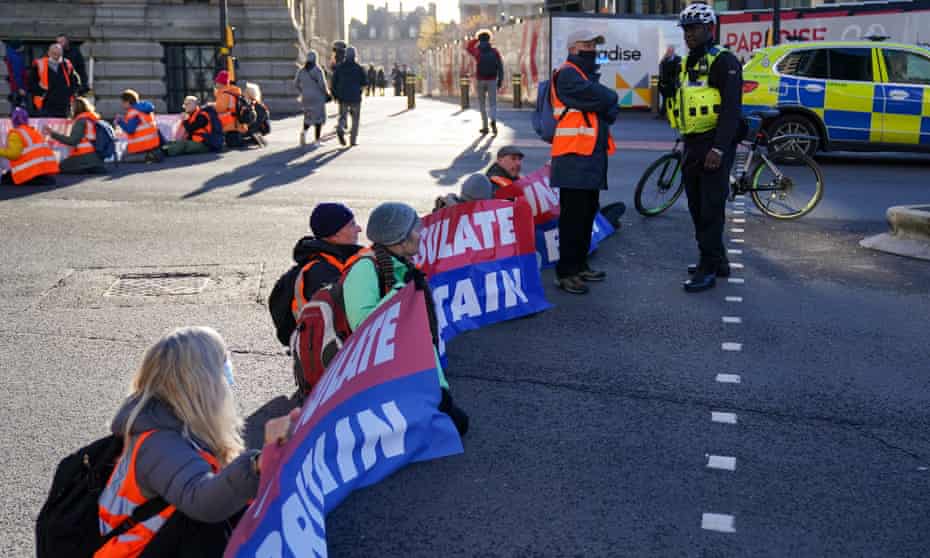Insulate Britain’s protests are disruptive, annoying – and justified

Like the suffragettes, protesters are castigated for taking direct action. But how else will we wake up to the climate emergency?

Few people today would claim not to sympathise with the suffragettes – but this wasn’t true at the time. When parliament debated women’s struggle for the vote in 1914, Lord Robert Cecil – later a recipient of the Nobel peace prize, who was in fact supportive of women’s suffrage – declared that “suffragist outrages” were a “very serious evil” with the aim of “anarchy”. There was only one solution “to prevent them from committing crimes”, he said: “deportation”. When Reginald McKenna, then home secretary in HH Asquith’s Liberal government, offered four options to deal with them – letting them die (“That is, I should say, at the present moment the most popular, judging by the number of letters I have received”); deportation; treating them as “lunatics”; or giving them the franchise – his fellow parliamentarians laughed uproariously at each.
The suffragettes, it should be said, did not sit around singing kumbaya, and were far more militant than contemporary protest movements in Britain. They committed arson, including the burning of several private homes – with five resulting deaths -and smashed up art galleries and museums. They attempted to destroy Glasgow’s aqueduct and attacked churches. Targets for bombing included the extremely busy street outside the Bank of England, although the device was defused, while a train driver was nearly killed by another bomb. Damned at the time as terrorists and anarchists, the militants are today seen sympathetically by history. As the cheerful “soldiers in petticoats” in Disney’s Mary Poppins predicted: “Our daughters’ daughters will adore us, and they’ll sing in grateful chorus: ‘Well done, Sister Suffragette!”
Why? Because the consensus is that the evil the suffragettes fought – the suppression of women’s basic democratic rights – was greater than any evil the suffragettes themselves were responsible for.
Eyes often roll when any movement is compared to the suffragettes, but the injustice that Insulate Britain confronts – the existential threat posed to humanity by the climate emergency – surely belongs in the same pantheon of struggles. Given the scientific consensus is that we face devastating consequences unless more radical action is taken, almost everyone respects the group’s cause, quite unlike the suffragettes at the time: it is their tactics that are contested.
As someone with a socialist perspective, there is much to sympathise with in the objections. Protest is supposed to target those with wealth and power: in the case of the climate emergency, that would mean focusing on the 100 companies responsible for 71% of global emissions, and the failures of the ruling Conservatives, who have received GBP1.3m from fossil fuel interests and climate sceptics since 2019. Insulate Britain target motorways which, statistically speaking, are largely used by ordinary citizens, including working-class people travelling to underpaid and undervalued jobs. A “just transition” is supposed to promote the idea that placing the global economy on a sustainable footing must not be achieved on the backs of poor people. Is glueing one’s face to motorways rather than the doors of Shell’s headquarters consistent with this demand?
All movements are told that they are protesting the wrong way by detractors who often pretend to be sympathetic to their aims. The suffragettes were victims of this narrative, as was the civil rights movement in the US – Martin Luther King was denounced for inciting “hatred and violence”. Gay rights and feminism were similarly denounced for their supposed counterproductive aggression and militancy. If only they could be more polite, less disruptive, less in your face then maybe people would listen!
Unfortunately strategies which, by definition, are more easily ignored are, well, ignored. When Extinction Rebellion protesters stormed the UK’s largest oil refinery last week, the presence of two national Olympians did not win them as much media attention as the motorway blockers. If, therefore, you believe that millions of lives are imperilled and we are running out of time to do something about it, which modern science treats as an indisputable fact, is it not rational to settle on the tactic that raises the most attention? How will a human race facing severe consequences of the climate crisis in 30 years, which are far more disruptive than today’s temporarily blocked motorways, look back at protesters doing something, anything, to raise the alarm?
Indeed, it is striking that Extinction Rebellion was unpopular, according to the polling back in their 2019 heyday. But surveys also revealed something else: that public concern about the environment surged to record levels after they began protesting. The very presence of – yes, inherently annoying – protests forced a conversation about an otherwise neglected issue, making people care more about it.
Public anger is also easily misdirected. Fury in recent weeks has been focused on ambulances delayed by protesters, though no one has been reported dead because of Insulate Britain. Yet where was the comparable outrage about a patient who died in an ambulance outside Addenbrooke’s hospital in Cambridge because it was too busy to cope? It is far easier to excite anger against the bogeyman of the disruptive activist than focus on the years of underfunding the health service, and a pandemic mishandled by Britain’s government.
If politicians were taking sufficient action to stave off climate calamity, and the media were more effective at building pressure on those in positions of power to act, then citizens would not be risking lengthy prison sentences by shutting down public infrastructure. That’s where the frustration should really lie. Our house is burning: should ire be focused on those pouring on the petrol, or on the tactics of those yelling “fire”? So yes, just like the suffragettes with their far more extreme tactics, Insulate Britain is profoundly unpopular – and yet everyone today pretends that they would have been on the side of the window-smashing soldiers in petticoats.